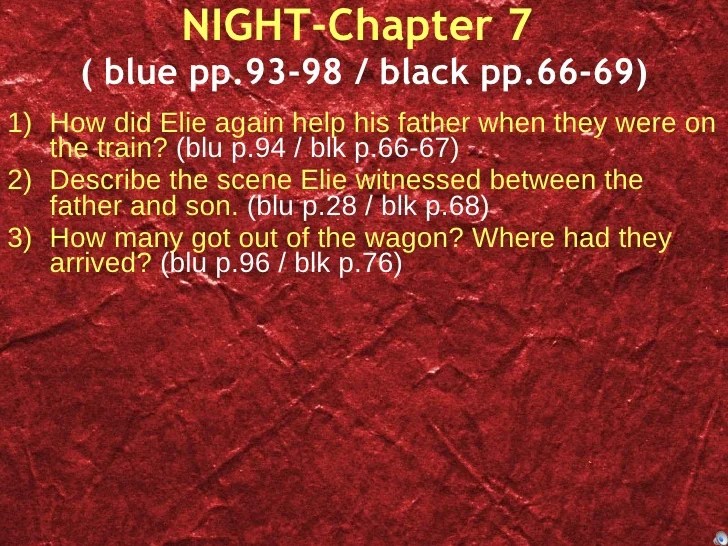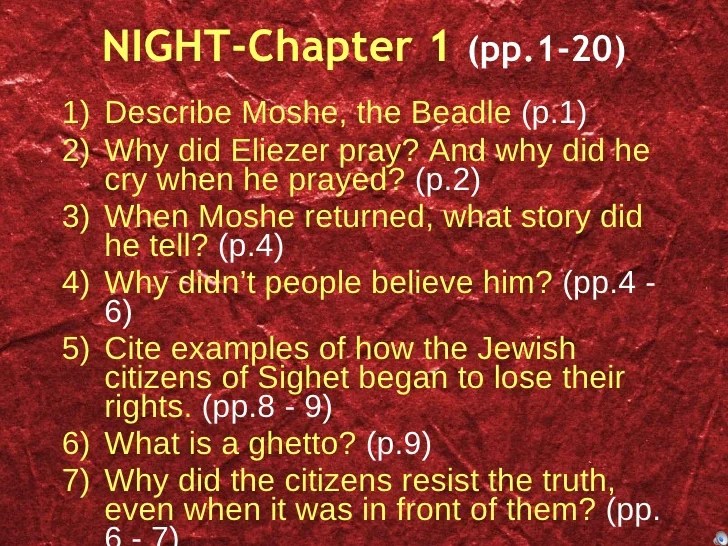Elie wiesel night study guide questions – Delving into Elie Wiesel’s Night Study Guide Questions, we embark on a profound literary journey that illuminates the horrors of the Holocaust through the eyes of a survivor. This guide offers a comprehensive exploration of Wiesel’s seminal work, providing insightful questions and analysis to enhance understanding and foster critical engagement.
Wiesel’s Night, a harrowing memoir of his experiences in Auschwitz and Buchenwald, stands as a powerful testament to the resilience of the human spirit amidst unimaginable suffering. Through the lens of literary analysis, this study guide delves into the novel’s structure, symbolism, and character development, revealing the profound themes of faith, hope, and despair that resonate deeply with readers.
Elie Wiesel’s Night: Historical Context

The Holocaust, a systematic genocide perpetrated by the Nazi regime, resulted in the murder of approximately six million Jews. Elie Wiesel, a Holocaust survivor, witnessed the horrors firsthand and dedicated his life to preserving the memory of those who perished.
Significance of Wiesel’s Personal Experiences
Wiesel’s experiences as a Holocaust survivor lend authenticity and depth to his writing. His firsthand account provides a unique perspective on the unimaginable horrors and resilience of the Jewish people.
Role of Memory and Testimony
Wiesel believed that remembering and testifying about the Holocaust was crucial for understanding its impact and preventing future atrocities. Through his writing, he aimed to ensure that the victims were not forgotten and that their stories served as a warning to humanity.
Literary Analysis of Night: Elie Wiesel Night Study Guide Questions

Night is a complex and multifaceted novel that employs various literary techniques to convey its powerful message.
Structure and Narrative Techniques, Elie wiesel night study guide questions
The novel is structured as a memoir, with Wiesel recounting his experiences as a Holocaust survivor. It uses a non-linear narrative, jumping between past and present, to create a sense of immediacy and disorientation.
Symbolism and Imagery
Wiesel uses powerful symbolism and imagery to convey the horrors of the Holocaust. Night, darkness, and fire represent the oppressive and destructive forces of the Nazi regime.
Character Development and Relationships
Wiesel’s portrayal of characters explores the psychological and emotional toll of the Holocaust. He focuses on the gradual erosion of faith, hope, and human dignity.
Themes in Night

Night explores a range of profound themes that resonate with readers to this day.
Faith, Hope, and Despair
Wiesel examines the complexities of faith and hope in the face of unimaginable suffering. The novel shows how despair can consume individuals, while hope can provide a glimmer of light in the darkest of times.
The Loss of Innocence
The Holocaust stripped its victims of their innocence and childhood. Wiesel’s writing captures the devastating impact of this loss on the human psyche.
The Power of Memory
Night emphasizes the importance of memory in preserving the truth and preventing future atrocities. Wiesel believed that remembering the Holocaust was a sacred responsibility.
Frequently Asked Questions
What is the significance of Elie Wiesel’s personal experiences in Night?
Wiesel’s firsthand account as a Holocaust survivor lends authenticity and emotional depth to his writing, providing a unique perspective on the horrors of the Nazi regime.
How does Night explore the theme of faith?
Wiesel’s memoir grapples with the complex interplay between faith and doubt in the face of unimaginable suffering, questioning the existence of God and the nature of belief.
What literary techniques are employed in Night?
Wiesel utilizes vivid imagery, symbolism, and a fragmented narrative structure to convey the surreal and often nightmarish experiences of the Holocaust.
